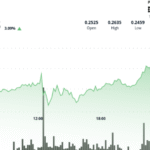The developer landscape in Latin America is evolving, with a notable trend toward working within established blockchain ecosystems, particularly Ethereum and Polygon. A recent report from Sherlock Communications reveals that a significant number of developers across Bolivia, Mexico, Brazil, and Peru are emphasizing transparency, coordination, and compliance in their projects.
The study incorporated qualitative insights from 85 developers, highlighting their preference for intuitive tools, comprehensive documentation, and established track records. Luiz Eduardo Abreu Hadad, a blockchain consultant and researcher at Sherlock Communications, pointed out that the developers in the region exhibit a “strong technical maturity” and are motivated by addressing tangible concerns in the real world. Even though they possess the skills to innovate and create new platforms, Hadad noted that the current focus is on leveraging established ecosystems like Ethereum and Polygon for development and adoption.
Supporting this trend, the report presented an analysis of on-chain data, revealing that Ethereum accounted for over 75% of blockchain transactions in Latin America from June 2024 to June 2025. During the same time frame, Polygon captured 11% of total activity, showing significant growth with its share nearly doubling to 20% in June 2025.
Despite the inclination toward established ecosystems, Hadad pointed out emerging local initiatives that have global potential. Projects focused on tokenization and national blockchain infrastructures, such as Núclea Chain and RBB in Brazil, demonstrate the region’s capability to foster new ecosystems.
Looking forward, the next generation of developers in Latin America is gearing up to concentrate on decentralized applications (DApps) and the tokenization of real-world assets (RWAs). Hadad noted that these newer developers are eager to engage in projects that can revolutionize sectors like social media and the creator economy. They are also showing interest in concepts such as supply chain traceability and decentralized physical infrastructure networks (DePIN).
The current crop of developers is searching for stable ecosystems, user-friendly tools, and sustainable economic incentives, highlighting a commitment to solving real-world issues related to trust, transparency, and usability. This movement reflects a growing appetite in Latin America for practical blockchain applications that can drive meaningful change.







